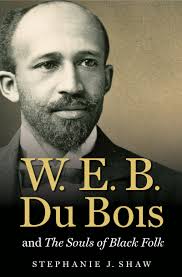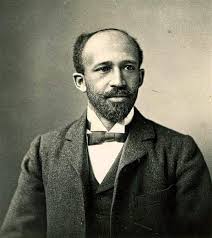The Souls of Black Folk Page #27
The Souls of Black Folk is a 1903 work of American literature by W. E. B. Du Bois. It is a seminal work in the history of sociology and a cornerstone of African-American literature. The book contains several essays on race, some of which the magazine Atlantic Monthly had previously published.
On we wind, through sand and pines and glimpses of old plantations, till there creeps into sight a cluster of buildings,—wood and brick, mills and houses, and scattered cabins. It seemed quite a village. As it came nearer and nearer, however, the aspect changed: the buildings were rotten, the bricks were falling out, the mills were silent, and the store was closed. Only in the cabins appeared now and then a bit of lazy life. I could imagine the place under some weird spell, and was half-minded to search out the princess. An old ragged black man, honest, simple, and improvident, told us the tale. The Wizard of the North—the Capitalist—had rushed down in the seventies to woo this coy dark soil. He bought a square mile or more, and for a time the field-hands sang, the gins groaned, and the mills buzzed. Then came a change. The agent’s son embezzled the funds and ran off with them. Then the agent himself disappeared. Finally the new agent stole even the books, and the company in wrath closed its business and its houses, refused to sell, and let houses and furniture and machinery rust and rot. So the Waters-Loring plantation was stilled by the spell of dishonesty, and stands like some gaunt rebuke to a scarred land. Somehow that plantation ended our day’s journey; for I could not shake off the influence of that silent scene. Back toward town we glided, past the straight and thread-like pines, past a dark tree-dotted pond where the air was heavy with a dead sweet perfume. White slender-legged curlews flitted by us, and the garnet blooms of the cotton looked gay against the green and purple stalks. A peasant girl was hoeing in the field, white-turbaned and black-limbed. All this we saw, but the spell still lay upon us. How curious a land is this,—how full of untold story, of tragedy and laughter, and the rich legacy of human life; shadowed with a tragic past, and big with future promise! This is the Black Belt of Georgia. Dougherty County is the west end of the Black Belt, and men once called it the Egypt of the Confederacy. It is full of historic interest. First there is the Swamp, to the west, where the Chickasawhatchee flows sullenly southward. The shadow of an old plantation lies at its edge, forlorn and dark. Then comes the pool; pendent gray moss and brackish waters appear, and forests filled with wildfowl. In one place the wood is on fire, smouldering in dull red anger; but nobody minds. Then the swamp grows beautiful; a raised road, built by chained Negro convicts, dips down into it, and forms a way walled and almost covered in living green. Spreading trees spring from a prodigal luxuriance of undergrowth; great dark green shadows fade into the black background, until all is one mass of tangled semi-tropical foliage, marvellous in its weird savage splendor. Once we crossed a black silent stream, where the sad trees and writhing creepers, all glinting fiery yellow and green, seemed like some vast cathedral,—some green Milan builded of wildwood. And as I crossed, I seemed to see again that fierce tragedy of seventy years ago. Osceola, the Indian-Negro chieftain, had risen in the swamps of Florida, vowing vengeance. His war-cry reached the red Creeks of Dougherty, and their war-cry rang from the Chattahoochee to the sea. Men and women and children fled and fell before them as they swept into Dougherty. In yonder shadows a dark and hideously painted warrior glided stealthily on,—another and another, until three hundred had crept into the treacherous swamp. Then the false slime closing about them called the white men from the east. Waist-deep, they fought beneath the tall trees, until the war-cry was hushed and the Indians glided back into the west. Small wonder the wood is red. Then came the black slaves. Day after day the clank of chained feet marching from Virginia and Carolina to Georgia was heard in these rich swamp lands. Day after day the songs of the callous, the wail of the motherless, and the muttered curses of the wretched echoed from the Flint to the Chickasawhatchee, until by 1860 there had risen in West Dougherty perhaps the richest slave kingdom the modern world ever knew. A hundred and fifty barons commanded the labor of nearly six thousand Negroes, held sway over farms with ninety thousand acres tilled land, valued even in times of cheap soil at three millions of dollars. Twenty thousand bales of ginned cotton went yearly to England, New and Old; and men that came there bankrupt made money and grew rich. In a single decade the cotton output increased four-fold and the value of lands was tripled. It was the heyday of the nouveau riche, and a life of careless extravagance among the masters. Four and six bobtailed thoroughbreds rolled their coaches to town; open hospitality and gay entertainment were the rule. Parks and groves were laid out, rich with flower and vine, and in the midst stood the low wide-halled “big house,” with its porch and columns and great fireplaces. And yet with all this there was something sordid, something forced,—a certain feverish unrest and recklessness; for was not all this show and tinsel built upon a groan? “This land was a little Hell,” said a ragged, brown, and grave-faced man to me. We were seated near a roadside blacksmith shop, and behind was the bare ruin of some master’s home. “I’ve seen niggers drop dead in the furrow, but they were kicked aside, and the plough never stopped. Down in the guard-house, there’s where the blood ran.” With such foundations a kingdom must in time sway and fall. The masters moved to Macon and Augusta, and left only the irresponsible overseers on the land. And the result is such ruin as this, the Lloyd “home-place’:—great waving oaks, a spread of lawn, myrtles and chestnuts, all ragged and wild; a solitary gate-post standing where once was a castle entrance; an old rusty anvil lying amid rotting bellows and wood in the ruins of a blacksmith shop; a wide rambling old mansion, brown and dingy, filled now with the grandchildren of the slaves who once waited on its tables; while the family of the master has dwindled to two lone women, who live in Macon and feed hungrily off the remnants of an earldom. So we ride on, past phantom gates and falling homes,—past the once flourishing farms of the Smiths, the Gandys, and the Lagores,—and find all dilapidated and half ruined, even there where a solitary white woman, a relic of other days, sits alone in state among miles of Negroes and rides to town in her ancient coach each day. This was indeed the Egypt of the Confederacy,—the rich granary whence potatoes and corn and cotton poured out to the famished and ragged Confederate troops as they battled for a cause lost long before 1861. Sheltered and secure, it became the place of refuge for families, wealth, and slaves. Yet even then the hard ruthless rape of the land began to tell. The red-clay sub-soil already had begun to peer above the loam. The harder the slaves were driven the more careless and fatal was their farming. Then came the revolution of war and Emancipation, the bewilderment of Reconstruction,—and now, what is the Egypt of the Confederacy, and what meaning has it for the nation’s weal or woe?
Translation
Translate and read this book in other languages:
Select another language:
- - Select -
- 简体中文 (Chinese - Simplified)
- 繁體中文 (Chinese - Traditional)
- Español (Spanish)
- Esperanto (Esperanto)
- 日本語 (Japanese)
- Português (Portuguese)
- Deutsch (German)
- العربية (Arabic)
- Français (French)
- Русский (Russian)
- ಕನ್ನಡ (Kannada)
- 한국어 (Korean)
- עברית (Hebrew)
- Gaeilge (Irish)
- Українська (Ukrainian)
- اردو (Urdu)
- Magyar (Hungarian)
- मानक हिन्दी (Hindi)
- Indonesia (Indonesian)
- Italiano (Italian)
- தமிழ் (Tamil)
- Türkçe (Turkish)
- తెలుగు (Telugu)
- ภาษาไทย (Thai)
- Tiếng Việt (Vietnamese)
- Čeština (Czech)
- Polski (Polish)
- Bahasa Indonesia (Indonesian)
- Românește (Romanian)
- Nederlands (Dutch)
- Ελληνικά (Greek)
- Latinum (Latin)
- Svenska (Swedish)
- Dansk (Danish)
- Suomi (Finnish)
- فارسی (Persian)
- ייִדיש (Yiddish)
- հայերեն (Armenian)
- Norsk (Norwegian)
- English (English)
Citation
Use the citation below to add this book to your bibliography:
Style:MLAChicagoAPA
"The Souls of Black Folk Books." Literature.com. STANDS4 LLC, 2025. Web. 9 Jan. 2025. <https://www.literature.com/book/the_souls_of_black_folk_310>.




Discuss this The Souls of Black Folk book with the community:
Report Comment
We're doing our best to make sure our content is useful, accurate and safe.
If by any chance you spot an inappropriate comment while navigating through our website please use this form to let us know, and we'll take care of it shortly.
Attachment
You need to be logged in to favorite.
Log In